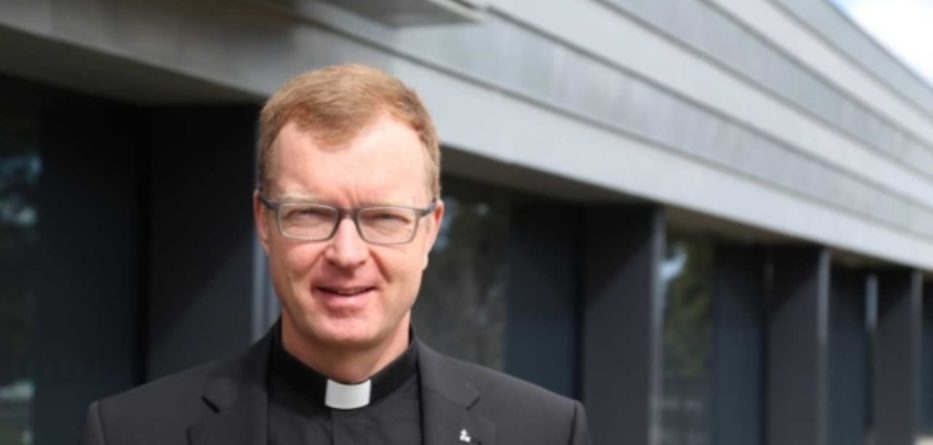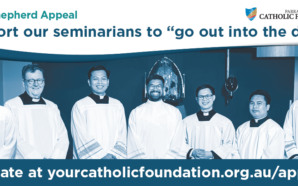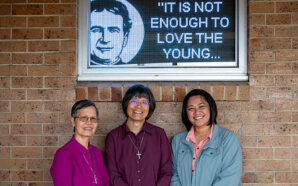The President of the Centre for Child Protection at the Gregorian University in Rome, and a member of the Pontifical Commission for the Protection of Minors, Fr Hans Zollner SJ, was in Australia in 2018 to speak to Catholic ministry leaders and survivors.
Michael McVeigh from Jesuit Communications sat down with him during the visit to explore how the Church is responding to the abuse crisis internationally, and what can be learned from our experiences in Australia.
MM: This is your third trip to Australia. You’ve visited quite a few other countries to see how the Church is responding to abuse around the world. Can you give us some idea of what the global picture looks like?

Fr Hans Zollner SJ
HZ: My understanding, after having visited about 50 countries on five or six continents, is that the Church is really starting to move over the last couple of years on the issue of doing justice to victims, of listening to them, and doing whatever can be done in terms of safeguarding.
I was with the Jesuit Provincials from all over Africa at the end of April, and the President of the Jesuit Assistancy of Africa and Madagascar is very much committed and dedicated to this. He has put up a thorough action plan for formation and for introducing guidelines all over the place. It’s a very considerate and very deliberate effort to do whatever can be done to be proactively engaged as Jesuits in Africa — in a continent where until a few years ago all of this was a foreign language.
One of the challenges of trying to develop this global approach is that you’re dealing with so many cultures, and so many different understandings. How do you bring this together and try to provide training and support religious communities tackling these issues?
This is one of the major questions we have. I think what I can do is stimulate discussion, stimulate reflection, and prepare people as much as possible so that they can do the groundwork.
The Centre for Child Protection at the Gregorian University does not pretend to have the response to every question. Not only because we don’t know the specific contexts — we might know a few of them, but we’re talking about thousands of cultures, we’re talking about hundreds of languages, we’re talking about very diverse legal backgrounds. It varies even sometimes within one country, such as Australia where you have states within the Commonwealth of Australia that have different laws than other states.
I am somebody who tries to elicit and stimulate discussion and reflection. I’m also very happy to listen to people.
You mentioned the need to listen and support victims in being heard. We’ve obviously had the Royal Commission here in Australia, but what are some of the other ways that you’ve seen that the voices of victims are being supported around the world?
In France there is one diocese that has established what they call ‘The Listening Space’. There, victims can come forward and they can express themselves. The bishop is present. It’s an open space in which people who have been hurt tremendously are free at least to express what they want to ask from the Church leadership etc.
There are other places in the USA or in other countries where victims have been invited by dioceses, by Provinces, by the leadership of the Church, to come forward. I have to say that overall I think there is a good will, and there are more people like bishops and provincials who listen to victims than we know. But there is no one model of giving victims not only the space to express themselves and be listened to, but also to engage actively in Church development.
In terms of setting up spaces for support for victims, what are some of the things you’ve seen that could really help — and that we could be considering here in Australia?
One of the major points that many victims bring up is, ‘Can’t we have, within parish settings, within schools settings, a regular conversation going on that includes survivors of abuse as regular members of a committee, a commission, a sounding board, a feedback group or something like that?’ So that this voice is not only brought in on a specific occasion, or where a person feels like he or she is at a point to be able to speak out about it, but [is heard] on a regular basis — build that voice into the system.
That will help all of us. It will help survivors and victims because they will feel welcome and appreciated in the specific experience, and in the specific life challenges, that they went through. Secondly it will help the community at large, because we can at least make ourselves more and more sensitive to what the concerns and specific needs of survivors are — that can also talk to the needs of young people.
M: We have strong groups of survivors here in Australia who have been able to support each other through that process. But what you’re saying is that we need some way of supporting those groups, and supporting those people, through our own institutions as well?
And I think we need to be creative. It will work for one school and one parish and one diocese in one way, and for others in a different way. Because the survivors with whom I am in constant contact, they have quite similar requests, and similar experiences in regard to being welcomed in the Church or not — feeling thrown out or dismissed. But they have also among themselves quite different expectations. So I have learned that you have also to be very forthcoming in accepting the differences in what this specific group, or this specific survivor, wants, requests and needs.
M: Survivors talk about wanting to have their stories heard and acknowledged. We’ve had the Royal Commission here in Australia, which provided an independent process where victims could come forward. Is there a need for something like that in terms of a truth, justice and reconciliation process for the Church internationally?
H: Yes, I think there is a need for that internationally. But I think first every local church needs to do its own homework. I don’t see it happening very soon that some such council or commission would be established to look into this area for the whole Church. The Church has a membership of 1.3 billion people, and is present in 190 countries, with all kinds of differences in expectations concerning psychological, spiritual and financial support.
There is one thing that I have come across consistently in communicating with, working with and listening to victims, and that is that they want to be listened to. So if there was the feeling that victims were constantly being listened to — in Rome and elsewhere — I think that would give a great relief to many victims.
I think [Pope Francis’] concern, especially with regard to your question, is that the local churches do whatever they can so that victims will be listened to in that particular country. I have a list of people who want to speak to the Holy Father directly, and physically it is impossible. I was there in 2014 to translate for two German survivors who were chosen with two Irish and two English survivors when he received the six of them at home. He took the whole morning listening to them one after the other. For each one, he was there for 40 to 45 minutes. Were he to do this for every survivor he couldn’t sleep anymore.
His example is modelling for the whole Catholic Church the way victims and survivors are received, welcomed and listened to. I think if the bishops and the provincials in this world, in all countries, followed his example, many survivors would be really appreciative of that.
Archbishop Diarmud Martin was recently quoted just before the World Meeting of Families, about the Pontifical Commission, saying that it’s too small as it’s currently set up to achieve what it needs to achieve. What’s your take on that? Does the Church need to be putting more resources into how it’s overseeing those issues?
At the moment we are 16 members from basically all continents, and the major language groups. We represent a variety of disciplines and professions, and the purpose of the commission — as the statutes that have just been promulgated state — is to provide counsel to the Holy Father.
A common misunderstanding about the commission is first that we deal with cases of allegations. That is not the case. We have no juridical or administrative power in regards to cases, because when it comes to allegations of abuse the tribunals and procedure are set.
A second misunderstanding is that we promote, directly, things on the ground. Our first and foremost goal is that we advise the Holy Father on issues.
So from my point of view, yes, we need to invest more. But we need to invest more on the local level, and we need to make sure that the proposals from the Pontifical Commission are forwarded to the Holy Father — which normally the President does — and then there is a follow-up process that reflects what we have given as our advice.
In Australia, Catholic Professional Standards Limited is overseeing the Church’s response and providing guidelines and support for ensuring all the institutions in the Church are child-safe institutions. Is there a need for some kind of organisational support from Rome for those bishops and dioceses that are struggling to form these institutions and provide safeguarding in those dioceses?
I think ultimately the commission will develop in that line. They are now in the process of hiring experts in those areas.
I think the Church needs to understand that the local churches can learn from each other mutually. And my understanding has always been — and I think the Holy Father has reminded us — that the Church will not function as a centralised company. It does not work like that, effectively. Every bishop, every bishops conference, has, to some extent, its life on its own. What we need to learn more is to open channels of mutual communication.
There are a number of things that people blame for abuse in the Church. As a priest and a psychologist, and as someone who has met and worked with survivors, what are your thoughts on that issue?
I think the question of where does abuse come from is the most important one, and the Pope has addressed that in his letter to the people of God published on 20 August. He says in the first paragraph, and repeats it over and over again, that the question of sexual abuse is always linked — or almost always linked — not only to the question of abuse of power, but also to the abuse of conscience.
So the real fundamental question of abuse is much more complex than just [the question of] sexuality — be it heterosexual or homosexual. It’s a power issue, and there we have to really work on the question of how do we understand priesthood, how to we understand bishophood, how do we understand and live out our ministries? What are the boundaries?
That’s why I’m very happy that the Jesuit Province in Australia is establishing a Code of Conduct. Because we don’t talk only about sexual abuse of minors. We talk about sexual abuse of adults, and we talk about abuse in other ways — like abuse of conscience, where you dictate to someone what you think, or you pretend to know by God, and you can tell another person, ‘You need to do that’, against the conscience of that person.
Many people think celibacy produces abuse. As I always say, celibacy as such is not cause for abusing — otherwise how do we explain that 99.9 per cent of all abusers do not live a celibate life, and how do we explain that 95 or 96 per cent of all priests do not abuse minors? But, celibacy, or a vow of chastity, that is not really integrated, that is not really lived out properly — yes, that produces a problem. Sometimes people take to drinking, sometime they take to gambling, and sometimes they take to sexual misconduct, with adults and with minors.
The real question about this is how do we deal with the notion of religious spiritual power with which priests and bishops are invested? How can theology help us to understand, and maybe how can sociology, psychology, or business administration help us to define the limits of power, and the necessity of keeping your boundaries.
With thanks to Michael McVeigh and the Australian Jesuits.
For information on Safe Parishes Week in the Diocese of Parramatta go to Diocese of Parramatta launches first Safe Parishes Week.








